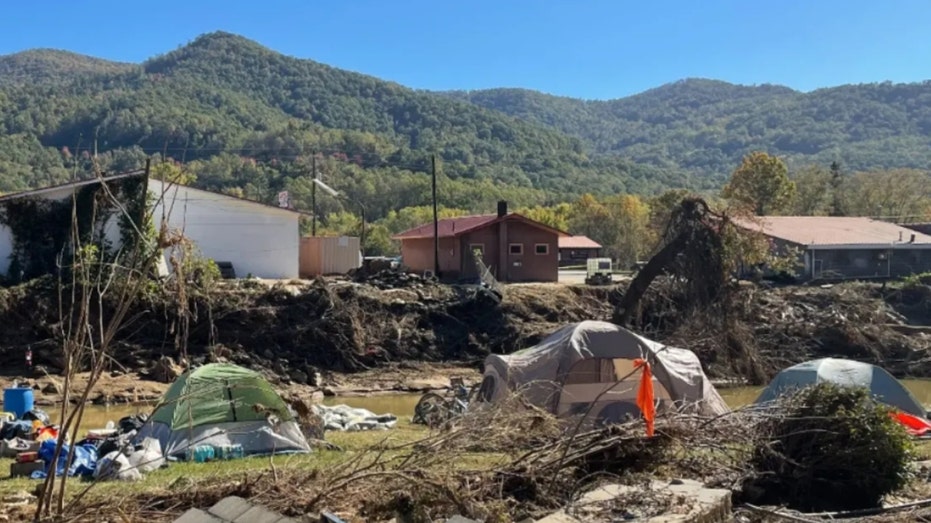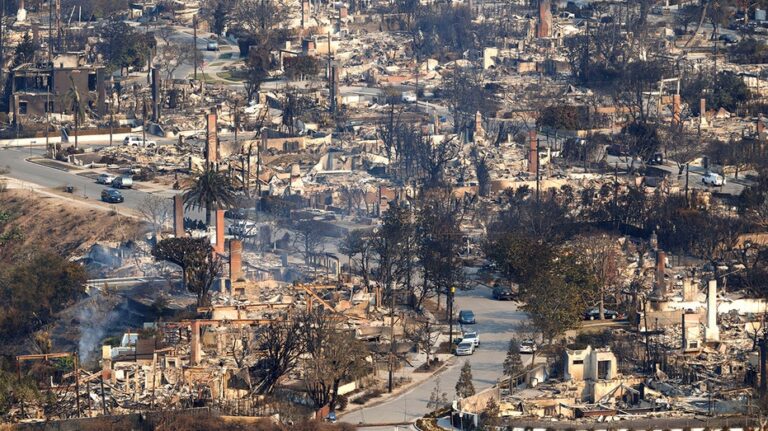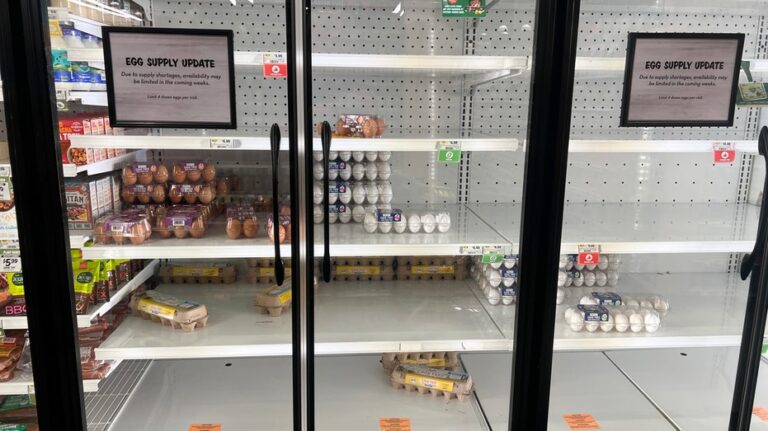
As the holiday season begins, residents of western North Carolina who lost everything during Hurricane Helene want their fellow Americans to keep them in mind.
Some people in hard-hit areas like Swannanoa and Burnsville, or in hard-to-reach places nestled in the Appalachian Mountains, are still living in tents or RVs where their homes once stood.
“We’ve been delivering campers,” Robert Pearson, a member of the Louisiana-based rescue organization Cajun Navy 2016, told Fox News Digital. “We delivered one just an hour before we’re doing this interview, and we’ve got two more we’re going to deliver this afternoon. But people have been donating campers to us, and we’ve been doing whatever we can to try to help. We have a list of people that need help.”
Cajun Navy 2016 is a group of civilian volunteers that formed after Hurricane Katrina to help those in need during and after disasters. They have had volunteers on the ground, including Pearson, since Sept. 27, the day Helene struck the North Carolina mountains.
WATCH: PEOPLE LIVE IN TENTS IN NC 2 MONTHS AFTER HELENE
“When we first got here, it was just utter chaos. There was a complete infrastructure failure. There were no phones, no electric, no water,” Pearson said. “And I’ll be honest with you, nobody knew what to do. We had wound up in a little town called Clyde, and they had their fire department destroyed. Like, just one whole section of town just had gotten wiped out there. And we stayed there.”
HURRICANE HELENE FORCES NORTH CAROLINA RESIDENTS TO SLEEP IN TENTS WHERE HOMES ONCE STOOD
The town of Montreat offered Cajun Navy 2016 a building to house 30 beds, and when volunteers filled all 30 beds, Montreat gave them another building for more beds, Pearson said.
People are still without cars, heating or internet in some places.
“Just looking at it in person [versus] seeing the pictures, it’s just hard to imagine how bad it is. … I went through Katrina, and this is Katrina-like to me,” Pearson said. “The damage is every bit as bad. It’s just different because it’s in the mountains, 100 yards this way, everything’s fine. But 20 miles down this river, it’s just utter chaos.”
Some can’t rebuild due to government regulations; others can rebuild but don’t have the money. Some are still without vehicles, and others have not found new work after losing their jobs. Bridges across towns and counties were destroyed and will take time to replace.
Pearson recalled delivering a camper to one family after their house was damaged by about 18 inches of flooding during Helene.
“So, definitely salvageable. Everything could be fixed. But they got this big sticker on the door that says the house has to be razed,” Pearson said. “So … there was a mortgage on the house. It’s not covered by homeowner’s insurance because the river took it out. They didn’t have flood insurance because it wasn’t a flood zone. … They owe a mortgage. They don’t have a house they can live in. What are they going to do? I don’t have an answer for that.”
Pearson delivered another camper to a family of five, including three children, who lost their house in a mudslide.
“I don’t think they had insurance. This was a 200-year-old home that had been handed down to the family for years and years. They’re just not well-off people, but great people. And they’re running off of generators because they don’t have a house to hook [a] power pole to,” Pearson said.
PUPPIES RESCUED FROM HURRICANE HELENE TO BE REHOMED WITH MILITARY MEMBERS, FIRST RESPONDERS
Counties that were dependent on the fall tourism season lost millions of dollars in revenue. Buncombe County officials are estimating a 70% loss in revenue for businesses reliant on tourism and hospitality in the final quarter of 2024, according to WFAE.
Volunteer organizations like Samaritan’s Purse, as well as churches and ministries from across the United States, still have boots on the ground in various towns around western North Carolina. The Federal Emergency Management Agency (FEMA) also has employees still deployed in the area.
FEMA recently came under fire after former supervisor Marn’i Washington instructed the agency’s relief workers to avoid reaching out to homeowners in Florida who had Trump signs displayed outside their homes after Hurricane Milton, which struck the U.S. about two weeks after Helene. Washington appeared on “Fox News @ Night” on Nov. 14 and said she was “simply executing” orders from her superiors to avoid political encounters that could be hostile.
FEMA did not immediately respond to Fox News Digital when asked to comment for this story.
FORMER FEMA OFFICIALS SAYS SHE’S BEING SCAPEGOATED:
In North Carolina, FEMA has so far approved “$722 million to support survivors with housing repairs, personal property replacement and other essential recovery efforts” and $1.1 billion for debris removal and other emergency protective services, according to a press release from the agency. FEMA has also deployed more than 4,800 personnel to the affected areas.
Americans from across the country have been donating everything from RVs to cars to tree-cutting and roof repair services to those in need. But what western North Carolina needs most now is money, according to those in the area.
HURRICANE EFFECTS POSE ‘TREMENDOUS’ HEALTH HAZARDS FOR AMERICANS, DOCTOR WARNS
Coree Loffink, a resident of Bakersville, told Fox News Digital that locals are struggling to get their day-to-day necessities because some large grocery stores are still closed and certain roads remain inaccessible.
“A lot of people are still living out of campers or looking for campers to live out of because they’re … living out of their cars or living in neighbors’ houses,” Loffink said. “But yesterday is going to be our last day of warm weather after this. … The high next week on Tuesday is 28 degrees, the low is like 14. So it is going to be a struggle for having heating sources out here.”
Even two months after Helene, while many roads and properties look better than they did after Sept. 27, “there’s still so much struggle and so much personal struggle and individual struggle from family to family,” Loffink said.
“It’s going to be a problem here for at least a few years for rebuilding, you know, creating jobs, just people trying to figure out their lives.” she said. “Do they want to stay? Do they want to go? If they stay, they have to try and rebuild. It’s just there’s a lot of complicated and stressful things that have popped up since the hurricane for families here.”
Loffink said it’s been hard to drive by the same destruction every day that cost some people their lives.
“There’s people out here who just cry every day because it’s so upsetting,” Loffink said. “I mean, you drive down Green Mountain and you see all the destruction out there. … There are some houses, and they got completely washed away in the Green River, and there’s a cross there. Those families did not make it, and it’s really unfortunate, but they had nowhere to go. And you still [are] going to see that stuff every day when you’re driving around.”
NORTH CAROLINA MAN SLEEPING IN TENT AFTER HURRICANE HELENE HAD TO REBURY FATHER’S CASKET ON PROPERTY
Volunteers are organizing hot Thanksgiving meals or delivering boxes of Thanksgiving food directly to people to cook themselves at home.
An Asheville-based charity called Chances for Children Carolinas, which was created by a group of children as a Destination Imagination Club service project to help other children receive scholarships for extracurricular activities, partnered with Grateful Village to host a holiday fundraiser for Helene survivors.
Volunteers with Chances for Children Carolinas organized a holiday pop-up store with donated giftable items that locals could purchase with vouchers, and 100% of the proceeds go directly back to families in need in western North Carolina.
Founder Mary Hudson Harrelson and her mother, Anna Harrelson, said they wanted to create a way for people who lost everything to purchase gifts with dignity rather than collect free donations. Harrelson described the people of western North Carolina as resilient and said even those who have lost homes and vehicles are still volunteering to help their neighbors.
Chances for Children Carolinas is collecting monetary donations through its website, chancesforchildrencarolinas.com, which they put directly into the hands of those in need who apply for assistance.
As the holiday season begins, residents of western North Carolina who lost everything during Hurricane Helene want their fellow Americans to keep them in mind.
Some people in hard-hit areas like Swannanoa and Burnsville, or in hard-to-reach places nestled in the Appalachian Mountains, are still living in tents or RVs where their homes once stood.
“We’ve been delivering campers,” Robert Pearson, a member of the Louisiana-based rescue organization Cajun Navy 2016, told Fox News Digital. “We delivered one just an hour before we’re doing this interview, and we’ve got two more we’re going to deliver this afternoon. But people have been donating campers to us, and we’ve been doing whatever we can to try to help. We have a list of people that need help.”
Cajun Navy 2016 is a group of civilian volunteers that formed after Hurricane Katrina to help those in need during and after disasters. They have had volunteers on the ground, including Pearson, since Sept. 27, the day Helene struck the North Carolina mountains.
WATCH: PEOPLE LIVE IN TENTS IN NC 2 MONTHS AFTER HELENE
“When we first got here, it was just utter chaos. There was a complete infrastructure failure. There were no phones, no electric, no water,” Pearson said. “And I’ll be honest with you, nobody knew what to do. We had wound up in a little town called Clyde, and they had their fire department destroyed. Like, just one whole section of town just had gotten wiped out there. And we stayed there.”
HURRICANE HELENE FORCES NORTH CAROLINA RESIDENTS TO SLEEP IN TENTS WHERE HOMES ONCE STOOD
The town of Montreat offered Cajun Navy 2016 a building to house 30 beds, and when volunteers filled all 30 beds, Montreat gave them another building for more beds, Pearson said.
People are still without cars, heating or internet in some places.
“Just looking at it in person [versus] seeing the pictures, it’s just hard to imagine how bad it is. … I went through Katrina, and this is Katrina-like to me,” Pearson said. “The damage is every bit as bad. It’s just different because it’s in the mountains, 100 yards this way, everything’s fine. But 20 miles down this river, it’s just utter chaos.”
Some can’t rebuild due to government regulations; others can rebuild but don’t have the money. Some are still without vehicles, and others have not found new work after losing their jobs. Bridges across towns and counties were destroyed and will take time to replace.
Pearson recalled delivering a camper to one family after their house was damaged by about 18 inches of flooding during Helene.
“So, definitely salvageable. Everything could be fixed. But they got this big sticker on the door that says the house has to be razed,” Pearson said. “So … there was a mortgage on the house. It’s not covered by homeowner’s insurance because the river took it out. They didn’t have flood insurance because it wasn’t a flood zone. … They owe a mortgage. They don’t have a house they can live in. What are they going to do? I don’t have an answer for that.”
Pearson delivered another camper to a family of five, including three children, who lost their house in a mudslide.
“I don’t think they had insurance. This was a 200-year-old home that had been handed down to the family for years and years. They’re just not well-off people, but great people. And they’re running off of generators because they don’t have a house to hook [a] power pole to,” Pearson said.
PUPPIES RESCUED FROM HURRICANE HELENE TO BE REHOMED WITH MILITARY MEMBERS, FIRST RESPONDERS
Counties that were dependent on the fall tourism season lost millions of dollars in revenue. Buncombe County officials are estimating a 70% loss in revenue for businesses reliant on tourism and hospitality in the final quarter of 2024, according to WFAE.
Volunteer organizations like Samaritan’s Purse, as well as churches and ministries from across the United States, still have boots on the ground in various towns around western North Carolina. The Federal Emergency Management Agency (FEMA) also has employees still deployed in the area.
FEMA recently came under fire after former supervisor Marn’i Washington instructed the agency’s relief workers to avoid reaching out to homeowners in Florida who had Trump signs displayed outside their homes after Hurricane Milton, which struck the U.S. about two weeks after Helene. Washington appeared on “Fox News @ Night” on Nov. 14 and said she was “simply executing” orders from her superiors to avoid political encounters that could be hostile.
FEMA did not immediately respond to Fox News Digital when asked to comment for this story.
FORMER FEMA OFFICIALS SAYS SHE’S BEING SCAPEGOATED:
In North Carolina, FEMA has so far approved “$722 million to support survivors with housing repairs, personal property replacement and other essential recovery efforts” and $1.1 billion for debris removal and other emergency protective services, according to a press release from the agency. FEMA has also deployed more than 4,800 personnel to the affected areas.
Americans from across the country have been donating everything from RVs to cars to tree-cutting and roof repair services to those in need. But what western North Carolina needs most now is money, according to those in the area.
HURRICANE EFFECTS POSE ‘TREMENDOUS’ HEALTH HAZARDS FOR AMERICANS, DOCTOR WARNS
Coree Loffink, a resident of Bakersville, told Fox News Digital that locals are struggling to get their day-to-day necessities because some large grocery stores are still closed and certain roads remain inaccessible.
“A lot of people are still living out of campers or looking for campers to live out of because they’re … living out of their cars or living in neighbors’ houses,” Loffink said. “But yesterday is going to be our last day of warm weather after this. … The high next week on Tuesday is 28 degrees, the low is like 14. So it is going to be a struggle for having heating sources out here.”
Even two months after Helene, while many roads and properties look better than they did after Sept. 27, “there’s still so much struggle and so much personal struggle and individual struggle from family to family,” Loffink said.
“It’s going to be a problem here for at least a few years for rebuilding, you know, creating jobs, just people trying to figure out their lives.” she said. “Do they want to stay? Do they want to go? If they stay, they have to try and rebuild. It’s just there’s a lot of complicated and stressful things that have popped up since the hurricane for families here.”
Loffink said it’s been hard to drive by the same destruction every day that cost some people their lives.
“There’s people out here who just cry every day because it’s so upsetting,” Loffink said. “I mean, you drive down Green Mountain and you see all the destruction out there. … There are some houses, and they got completely washed away in the Green River, and there’s a cross there. Those families did not make it, and it’s really unfortunate, but they had nowhere to go. And you still [are] going to see that stuff every day when you’re driving around.”
NORTH CAROLINA MAN SLEEPING IN TENT AFTER HURRICANE HELENE HAD TO REBURY FATHER’S CASKET ON PROPERTY
Volunteers are organizing hot Thanksgiving meals or delivering boxes of Thanksgiving food directly to people to cook themselves at home.
An Asheville-based charity called Chances for Children Carolinas, which was created by a group of children as a Destination Imagination Club service project to help other children receive scholarships for extracurricular activities, partnered with Grateful Village to host a holiday fundraiser for Helene survivors.
Volunteers with Chances for Children Carolinas organized a holiday pop-up store with donated giftable items that locals could purchase with vouchers, and 100% of the proceeds go directly back to families in need in western North Carolina.
Founder Mary Hudson Harrelson and her mother, Anna Harrelson, said they wanted to create a way for people who lost everything to purchase gifts with dignity rather than collect free donations. Harrelson described the people of western North Carolina as resilient and said even those who have lost homes and vehicles are still volunteering to help their neighbors.
Chances for Children Carolinas is collecting monetary donations through its website, chancesforchildrencarolinas.com, which they put directly into the hands of those in need who apply for assistance.



